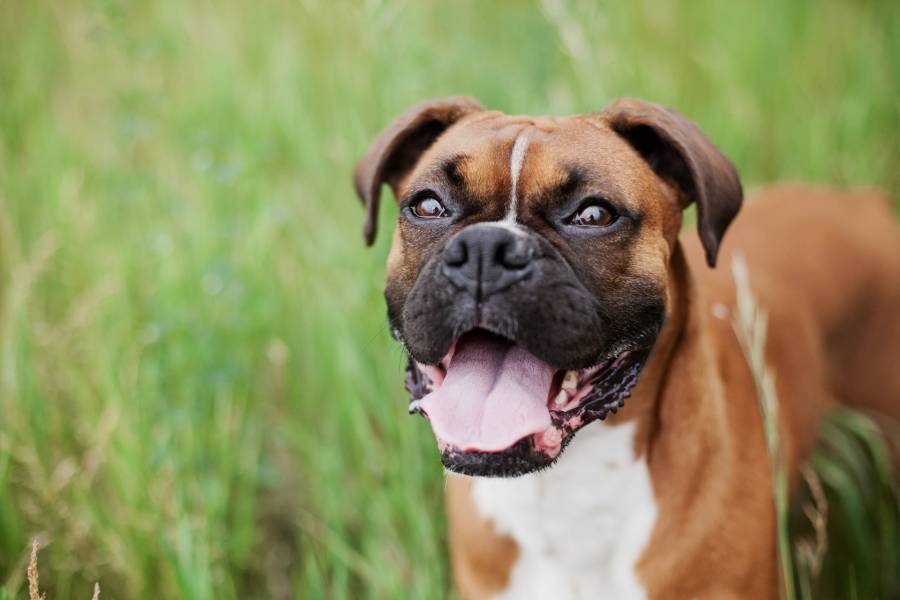Quick Navigation
It can be troublesome to watch your dog exhibit abnormal behaviors.
One of these concerning conditions is when your dog is breathing heavily and won’t lie down.
A strange combination of behaviors, isn’t it?

It is, however, not that uncommon and can stem from several causes.
All of them require immediate attention for your beloved dog.
There is rarely a harmless reason why your dog is breathing heavily and won’t lie down.
At the same time, you need to know what to do about it.
Common Reasons Behind Heavy Breathing In Dogs
Here are some of the causes behind this behavior:
- Insect or snake bite
- Some fear or stress
- Separation anxiety
- Poison
- Bloating
- Pain
- Arthritis
- Injury
Insect Or Snake Bite
A sting by an insect such as a bee can induce an allergic reaction in dogs just as it can in humans.
If your dog starts breathing heavily and won’t lie down, you may want to consider insect or snake bites.
To identify it, you may want to look for swelling, i.e., in the region where the insect may have bitten.
However, the dog collapses in extreme cases if you need not worry too much.
You may take your dog to a vet to deal with the situation.
A vet can deal with the situation aptly, ensuring your dog is safe.
Some Fear Or Stress
Just as humans are restless and experience difficulty breathing when stressed, dogs can say the same.
If your dog is breathing heavily and won’t lie down, it likely is because your dog is facing some stress.
Dogs show signs of stress through their body language and physical behavior to let you know they are not comfortable.
The cause of stress may be anything from car rides to thunderstorms or even from meeting other dogs.
Other signs of stress you may want to look out for include yawning, blinking, and lip licking.
You want to remove the stressor and find a quiet place for your dog to calm down.
At the same time, avoid over-comforting and pampering your dog too much.
Separation Anxiety
Dogs are highly dependent on their owners or their parents.
When they are left alone for a long time, they experience anxiety due to being separated from their parent.
It is called separation anxiety. Separation anxiety could be why your dog is breathing heavily and won’t lie down.
It has especially become common in dogs in the light of Covid-19.
Many dog owners have worked from home for a long time during lockdowns.
Hence, it may become harder for your dog to adjust to spending a lot of time away from you.
Additionally, dogs suffering from anxiety disorders, such as separation anxiety or specific fears and phobias, have difficulty falling asleep.
It may also be due to other reasons such as the loss of a household member or changes in routine.
To help ease your dog’s separation anxiety, you can take small measures.
For example, rewarding your dog with a treat every time you leave makes you go more low-key.
If this doesn’t work, you can use natural calming supplements.
Poison
If your dog is breathing heavily and won’t lie down, there is a possibility that your dog has consumed something poisonous.
This poisonous substance could be anything from rat poison to antifreeze or any household item.
If you suspect your dog has consumed something poisonous, you may want to look for other signs of poisoning.
These include vomiting and, in worse cases, even seizures.
If you suspect your dog has consumed something poisonous, emergency care is advised.
It would be best to take your dog to the vet right away.

Bloating
If your dog is breathing and heavy and won’t lie down, there is a chance it is because your dog is bloated.
If your dog is large and deep-chested, it is even more likely that this is why.
Aside from panting and pacing, other signs of bloating are drooling, biting at its sides, and retching without vomiting.
Bloating is one of the conditions in dogs that call for immediate veterinary care.
Large and giant breeds of dogs, including Labrador Retrievers, Golden Retrievers, Irish Setters, St. Bernards, Gordon Setters, Newfoundlands, Weimaraners, German Shepherds, and Great Danes, are most at risk.
That is why you must keep an eye on their diet. You wouldn’t want something to go wrong because of slight negligence.
Instead of giving your dog one big meal a day, split his meals into two smaller ones, and avoid letting him play or exercise vigorously right after a meal to reduce the risk of bloat.
Pain
Dogs are masters at hiding the fact that they are in pain.
While dogs may vocalize or limp while hurting, we may not even notice at other times.
For this reason, it is crucial to look for subtle signs of pain in your dog.
Dogs in pain exhibit heavy breathing or panting, especially while resting.
They may also hold their bodies abnormally.
If you see your dog breathing heavily and won’t lie down, there is a huge chance your dog is in pain.
Possible causes of this pain may be mouth pain, gastrointestinal problems, ear pain, or eye pain.
Such pain typically occurs due to infections and even cancer in the worst cases.
If you suspect your dog is in pain, you should consult a vet.
It is an efficient way to get to the root cause of the pain.
Arthritis
Panting and the inability to lie down may also signify your dog’s chronic disease or illness. One of these is arthritis.
If your dog especially pants when it tries to move around, there is a chance that it is because of arthritis.
Your dog may experience pain in its joints attempting to move around. Another obvious sign is limping.
Furthermore, arthritis may make it difficult for your dog to stand up or even lie down, which would explain why your dog won’t lie down.
Large breed dogs and obese dogs are more likely than other dogs to develop joint pain and arthritis as they age.
Avoid overworking your dog’s joints and bones while he is still young and growing to prevent or delay the onset of joint problems.
It also helps to have a soft dog bed available for your dog at all times.
An orthopedic dog bed is the best option for your older dog because it is specifically designed to support joints and relieve pain.
If you suspect your dog has arthritis, you should consult your vet.
They may treat your dog with Nonsteroidal anti-inflammatory drugs (NSAIDs) and joint supplements and diets.
Injury
As explained earlier, dogs can be experts at hiding the fact that they are in pain.
If your dog is breathing heavily and won’t lie down, the cause of the pain could be an injury.
The pain from the injury would explain why your dog is breathing heavily and is reluctant to lie down.
Other signs that your dog is hurting include enlarged pupils, reduced appetite, and licking or biting at the injury site.
At the same time, you may notice your dog masking its pain with behaviors such as wagging its tail while you’re around.
If you notice these symptoms in your dog, a visit to the vet is due.
Final Thoughts
Now that you know all the possible reasons your dog could be breathing heavily and being reluctant to lie down, you can start monitoring your dog.
Once you narrow it down, you should react to save your dog more pain and avoid making the situation worse.
After all, it does break our hearts to see those adorable creatures hurting.

Zoey is a long-time pet owner and animal rights advocate, a vital part of Purrfect n’ Pawesome. She shares her unique experiences and learnings with her readers to enhance their understanding of pet behavior and nutrition. Along with being an active pet writer, she volunteers at multiple animal shelters, rescue centres with some bespokenly awesome pets.
Zoey has a lot to share when raising the pets and spending life being their true friends. She has a quite pampered Persian cat and a Ragdoll, whom she loves the most. Readout her blogs to know more about being a responsible parent to your beloved pets.
“I love to be around cats and dogs; that’s my passion and my trick to get away from all the negativity and soaking in unconditional love and affection. Being attached to this platform gives me the reason to be vocal about pet love, care, and nurturing. Although I am not an expert or veterinarian by any means, I have a lot of experience and learnings to share with my fellow readers.”


